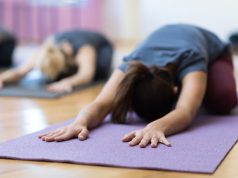Movement-based mind-body interventions could be effective alternatives to drugs, surgery, injections
WEDNESDAY, Feb. 12, 2020 (HealthDay News) — Movement-based mind-body interventions (MMBIs), particularly yoga, are effective for reducing low back pain, according to a review published in the January/February issue of Holistic Nursing Practice.
Juyoung Park, Ph.D., from Florida Atlantic University in Boca Raton, and colleagues conducted a narrative literature review to evaluate the effects of MMBIs (e.g., yoga, tai chi, and qigong) on low back pain. The analysis included 25 studies focused on yoga intervention, four focused on qigong, and three focused on tai chi in managing back pain (total 3,484 participants aged 33 to 73 years).
Based on the included studies, the researchers found that MMBI is effective for treatment of low back pain and showed positive outcomes such as reduction in pain or psychological distress (e.g., depression and anxiety) and improved functional ability. Specifically, longer-duration and high-dose yoga interventions showed reductions in back pain, while tai chi reduced acute lower back pain in men in their 20s. Compared with stretching, tai chi also was more effective for lower back pain in young men. Tai chi showed greater reductions in pain intensity, bothersomeness of pain symptoms, and pain-related disability than the control intervention in the general population. There was not enough evidence to determine if qigong is useful in treating chronic lower back pain. Tai chi and qigong for lower back pain are still underinvestigated compared with yoga interventions.
“The three MMBIs could be used as effective treatment alternatives to pain medications, surgery, or injection-based treatments (e.g., nerve blocks) that are associated with high incidence of adverse effects in treating LBP,” the authors write.
Copyright © 2020 HealthDay. All rights reserved.








